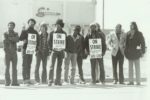For this week’s member spotlight, we chatted with Local 75 member and steward Mike Dillard. Mike has worked at Kroger stores in Cincinnati, Ohio and in nearby Kentucky for 25 years now, and has seen how being a union member truly makes a difference in the workplace. Today, he is an assistant meat manager.
In honor of Black History Month, he also shared with us some stories of his his grandfather and father, who lived during the height of the civil rights movement.
His father, a retired one star general and doctor, was the second black general in Ohio, and was a participant in several marches for equality in the 60’s. His grandfather, Mike tells us, was a doctor during World War I. However, when Mike’s grandfather Charles served during the war in the army, they refused to recognize his M.D., and made him scrub latrines instead. Although Mike remembers this story of his grandfather’s with sadness, he notes that he went on to later found a radiology center at the University of Michigan, with pride.
Mike also shares that he recently discovered that he and his family are direct descendants of a unit in the Civil War called the Black Brigade. Mike explains that during the Civil War, many African Americans living in Kentucky moved slightly further north into Ohio because it was less hostile towards them, and to escape the Confederacy which had moved up into Kentucky. When the confederates were on the verge of attacking the Cincinnati area, Union troops began taking black men against their will and put them to work to fortify the city and build trenches. But upon hearing this, one of the Union generals was outraged that these men had been forced to work, and demanded their release and an apology. Once the group of African American men returned to their homes, they were then asked if they would be willing to volunteer their time helping build defenses and fortifications for the city. Despite the previous gross violation of their human rights–being made to work against their will–nearly 1,000 African American men from the area agreed to help the Union troops. This group of men was dubbed the Black brigade, and became the first of many such groups to form throughout the country–building bridges and trenches, hauling cannons, and assisting the cause in many other ways. Mike notes that thanks to the help of this Black Brigade, the Confederacy was effectively kept out of Ohio and they saw no bloodshed. There is even a memorial statue in a nearby park that commemorates the group, Mike says.
Unfortunately, Mike has experienced some conflict in his own experiences too, having dealt with a verbally and at one point physically abusive manager for a time. Thankfully, being a union member meant that Mike had the support he needed to get out of the situation. Mike says he tries to use what he has learned as a union worker, as well as his family’s rich history dealing with fighting for civil rights, to help his fellow union members.
“I’m a nice guy and I try to keep an open mind and good rapport with managers and my fellow associates,” say Mike. When Mike tells us that it is “better to get more bees with honey than it is with vinegar”, we are reminded of the teachings and actions of Martin Luther King Jr. and Bayard Rustin, both Civil Rights leaders who valued peaceful protest rather than violence.
As Mike reflects, he notes that the fight for equal civil rights and the fight for equal workers rights often have the same goal. When telling someone about the union at work, Mike explains that “you have a stronger voice with more people, just like with civil rights, you know if you have one person yellin’, you’re not going to be heard as much as 10,000 people yelling” for the same cause. “With both the union and with the civil rights movement, you have solidarity. It’s about being fair, and everyone having the rights that they should have.”
Do you have a story to share about being a union member, or about participating in the civil rights movement? Let us know here!


